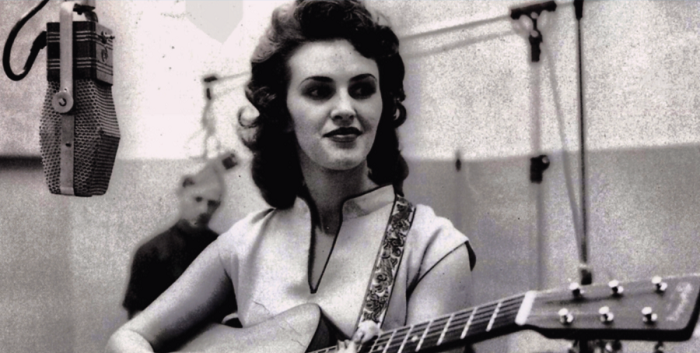THIS WEEK’S MUSE
WANDA JACKSON

“All I wanted to do was sing and play music.”
In the 1950s, after early success as a country artist, Wanda Jackson found her feet as one of the first female rock n roll stars. That helped her earn the nickname “The Queen of Rockabilly.”
Jackson was born in 1937, in Maud – a small border town just a few miles east of Oklahoma City. As a young girl her mother encouraged her to sing, partly to know her daughter was safe even when she was out of sight. Encouraged by her father, she took guitar and piano lessons, and by her mid-teens, had her own radio show performing country songs. “I was flying by the seat of my pants,” she said later, “but it didn’t scare me to get out on a limb and try something brand new. I liked it.”
Rockabilly is one of the earliest rock ‘n’ roll music styles, dating back to the early 1950s. It was especially popular in the southern American states when mixing country with rhythm and blues or blue grass became increasingly popular. The term rockabilly is a portmanteau of “rock” (from “rock ‘n’ roll”) and “hillbilly,” the latter a reference to the country music (often called “hillbilly music” in the 1940s and 1950s) that contributed to the development of the style.
Some key names grew out of rockabilly, many of whom recorded for the Sun Records label. Elvis Presley, Carl Perkins, and Jerry Lee Lewis were among the biggest stars, turning rockabilly into a national sensation by the mid-1950s. And through this melting pot – full of exciting new music and young, energetic performers – the teenage Wanda Jackson emerged.
Opposition from a male dominated industry—”Girls don’t sell records!” according to Capitol Records’ producer Ken Nelson—only made Jackson more determined to succeed. “I was breaking out of the shell,” she said later. “They weren’t going to help me, but I hung in there and kept doing it anyway.”
From her first hit song, “You Can’t Have My Love,” in May 1954, she went on to make over 30 hit albums in a career spanning 70 years. Her vocal delivery seems to reflect her singular determination and ambition, variously described as a snarl or a growl, and caused one critic to describe Jackson as “a really sweet lady – with a nasty voice.”
The rockabilly styles of the late 1950s—some of which filtered through Jackson’s sound—included strong rhythms, boogie-woogie riffs, doo-wop acapella, and later the use of tape echo and effects. In the late 1970s and early 1980s, rockabilly enjoyed a revival, and strong interest endures today, often within new musical subcultures and developing genres. Artists as diverse as Bruce Springsteen, Elvis Costello, Cyndi Lauper and Adele have cited Jackson as a major influence.
Jackson released her last album—Encore—in 2021. Appropriately, it was an album of personal songs about her life. “The songs you hear are truly my life story. This is the first time I have ever inserted so much of my personal life into my music.” Following the release and having given up performing several years before, Jackson said it would be her final album – retiring to her home in Oklahoma.
HAPPENING
CHAKRAS

Four Fridays, beginning June 3, from 6–8pm
Awakening to your Chakras
With Nancy Lord
A guided meditation, with instruction on the Chakra body field.
$112 – Member, $128 – Non-Member
